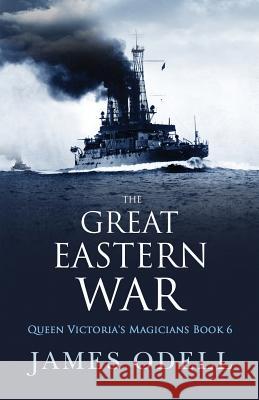The Great Eastern War » książka
The Great Eastern War
ISBN-13: 9780993460173 / Angielski / Miękka / 2016 / 464 str.
Lord Palmerston has a grand plan to destroy the Russian Empire and seize the Caucasus as a British protectorate. He knows that Britain cannot do this alone so he persuades the French to lend their support. He gives orders for Russian territory to be attacked all around the world. In the American North-West, the director of the Hudson's Bay Company and the director of the Russian Alaska Company have agreed not to attack each other. But the governor of the Vancouver colony has orders to take the offensive. He asks Ernest Woods, a disgraced cavalry officer, to raise an expeditionary force. The Californian gold rush is at its height and Ernest cannot find enough men. His answer is to ask the local Salish Indians to take part. The Russians ensure the cooperation of the Tlingit Indians by taking their children hostage. Ernest knows that if he can free the hostages, the Tlingit will turn against the Russians. In England, Charles Lloyd is asked to travel out to the Middle East and improve communications between the British general, Lord Raglan, and London. But Lord Raglan enjoys his independence and does not want any communication with London at all. He is hostile to any innovation. Charles is uncomfortable about Palmerston's grand plan to betray his allies. But, as an officer, he cannot object. When Palmerston forces Queen Victoria to appoint him as her Prime Minister he appears to be unstoppable. But as the British army makes one mistake after another, Palmerston's strategy begins to unravel. Charles's wife wants to accompany him to the Middle East. She is sure that she can assist him in carrying out his duties. In Washington, Minister of War Davis is concerned about developments in military technology in Europe. The United States may be left behind. He asks three West Point officers to travel to Europe and investigate. The existence of this commission is public knowledge but its agenda is not. Before the officers can visit the battlefield they must request permission from Queen Victoria and Emperor Napoleon. Queen Victoria has no objections but Emperor Napoleon is suspicious. The officers begin to fear that the war will be over before they can reach the battlefield.
Lord Palmerston has a grand plan to destroy the Russian Empire and seize the Caucasus as a British protectorate. He knows that Britain cannot do this alone so he persuades the French to lend their support. He gives orders for Russian territory to be attacked all around the world. In the American North-West, the director of the Hudson's Bay Company and the director of the Russian Alaska Company have agreed not to attack each other. But the governor of the Vancouver colony has orders to take the offensive. He asks Ernest Woods, a disgraced cavalry officer, to raise an expeditionary force. The Californian gold rush is at its height and Ernest cannot find enough men. His answer is to ask the local Salish Indians to take part. The Russians ensure the cooperation of the Tlingit Indians by taking their children hostage. Ernest knows that if he can free the hostages, the Tlingit will turn against the Russians. In England, Charles Lloyd is asked to travel out to the Middle East and improve communications between the British general, Lord Raglan, and London. But Lord Raglan enjoys his independence and does not want any communication with London at all. He is hostile to any innovation. Charles is uncomfortable about Palmerston's grand plan to betray his allies. But, as an officer, he cannot object. When Palmerston forces Queen Victoria to appoint him as her Prime Minister he appears to be unstoppable. But as the British army makes one mistake after another, Palmerston's strategy begins to unravel. Charles's wife wants to accompany him to the Middle East. She is sure that she can assist him in carrying out his duties. In Washington, Minister of War Davis is concerned about developments in military technology in Europe. The United States may be left behind. He asks three West Point officers to travel to Europe and investigate. The existence of this commission is public knowledge but its agenda is not. Before the officers can visit the battlefield they must request permission from Queen Victoria and Emperor Napoleon. Queen Victoria has no objections but Emperor Napoleon is suspicious. The officers begin to fear that the war will be over before they can reach the battlefield.











